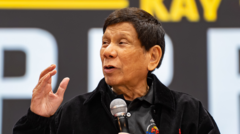This election marks a pivotal moment where the future of Filipino leadership hangs in the balance amid rising tensions between the Marcos and Duterte families, both embroiled in a historic feud.
A New Era of Political Strife in the Philippines: The Marcos-Duterte Showdown

A New Era of Political Strife in the Philippines: The Marcos-Duterte Showdown
As the dust settles from the recent elections, a fierce political battle reignites between President Marcos and Vice-President Duterte.
The Philippine elections have concluded, marking the beginning of a tumultuous political landscape. President Ferdinand "Bongbong" Marcos Jr., and his Vice-President, Sara Duterte, once allies in the elections, now find themselves embroiled in a deep-rooted conflict over power, igniting a political rivalry reminiscent of a Game of Thrones narrative. After their 2022 electoral victory, their alliance began to unravel with accusations of assassination threats and incompetence, setting the stage for a heated mid-term election crucial for asserting dominance among political dynasties.
The election results, however, have not favored the Marcos administration, with only half of the twelve elected senators aligning with him. This outcome stands as a surprising deviation from the usual trend where incumbents secure the majority of their nominations in mid-term contests. Historically, presidential patronage plays a significant role in elections, but that advantage appears less effective this time around. As the electoral landscape shifts, the risk of President Marcos's authority within the government further declines, raising questions regarding the feasibility of his proposed impeachment against Duterte.
Political tension surged this year following the congressional decision to initiate impeachment proceedings against Vice-President Duterte. This move marked an irreversible shift in their strained partnership, especially after Marcos's controversial decision to extradite former President Rodrigo Duterte, Sara's father, to face charges related to his notorious war on drugs. This deep schism escalates the stakes for both factions, particularly given Sara Duterte's ambitions for the presidency in the next elections—ambitions that hinge significantly on her political survival.
Political legacies run deep in the Philippines, with dynasties like the Marcoses and the Dutertes firmly entrenched in the national psyche. The Marcos family has wielded power for decades, while the Duterte family maintains an enduring grip over Davao. Despite the fraught rivalry, senators from both political factions possess their own ambitions, complicating loyalties and alliances that could dictate the outcome of Sara Duterte's potential impeachment.
As public opinion swings, the tide appears to favor Sara Duterte, reflected by her increasingly popular rallies highlighting her father's treatment at the hands of the Marcos regime. The recent surprise victories of liberal senators in this election may signal a growing disenchantment with dynastic politics and could represent an unforeseen hurdle for the Marcos camp as they pursue impeachment strategies against Duterte.
This upcoming year promises a politically charged atmosphere, with the potential impeachment trial for Duterte poised to commence in July. The stakes are high within a fragmented political landscape where loyalty in the senate is tenuous, and both camps will engage in an all-out bid to sway undecided senators. In a perplexing political first for the Philippines, tensions may lead to unprecedented legislative confrontations at the hands of historical enemies, setting the stage for a turbulent political showdown.
The election results, however, have not favored the Marcos administration, with only half of the twelve elected senators aligning with him. This outcome stands as a surprising deviation from the usual trend where incumbents secure the majority of their nominations in mid-term contests. Historically, presidential patronage plays a significant role in elections, but that advantage appears less effective this time around. As the electoral landscape shifts, the risk of President Marcos's authority within the government further declines, raising questions regarding the feasibility of his proposed impeachment against Duterte.
Political tension surged this year following the congressional decision to initiate impeachment proceedings against Vice-President Duterte. This move marked an irreversible shift in their strained partnership, especially after Marcos's controversial decision to extradite former President Rodrigo Duterte, Sara's father, to face charges related to his notorious war on drugs. This deep schism escalates the stakes for both factions, particularly given Sara Duterte's ambitions for the presidency in the next elections—ambitions that hinge significantly on her political survival.
Political legacies run deep in the Philippines, with dynasties like the Marcoses and the Dutertes firmly entrenched in the national psyche. The Marcos family has wielded power for decades, while the Duterte family maintains an enduring grip over Davao. Despite the fraught rivalry, senators from both political factions possess their own ambitions, complicating loyalties and alliances that could dictate the outcome of Sara Duterte's potential impeachment.
As public opinion swings, the tide appears to favor Sara Duterte, reflected by her increasingly popular rallies highlighting her father's treatment at the hands of the Marcos regime. The recent surprise victories of liberal senators in this election may signal a growing disenchantment with dynastic politics and could represent an unforeseen hurdle for the Marcos camp as they pursue impeachment strategies against Duterte.
This upcoming year promises a politically charged atmosphere, with the potential impeachment trial for Duterte poised to commence in July. The stakes are high within a fragmented political landscape where loyalty in the senate is tenuous, and both camps will engage in an all-out bid to sway undecided senators. In a perplexing political first for the Philippines, tensions may lead to unprecedented legislative confrontations at the hands of historical enemies, setting the stage for a turbulent political showdown.






















